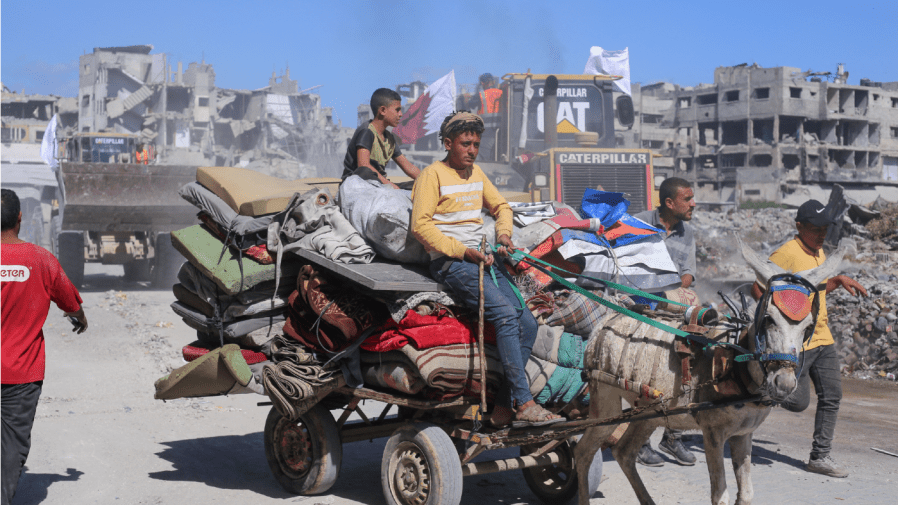
At his recent meeting with Israeli Prime Minister Benjamin Netanyahu, President Trump, released “20 points” outlining how, with the support of Arab neighbors, Europeans and others, the devastating conflict that began Oct. 7, 2023 with Hamas’s brutal attack on Israel might end and a lasting peace be established.
Netanyahu accepted the 20 points as a way forward. The framework was presented to Hamas by Arab mediators and Hamas’s first response is to say it is willing to release the hostages but it would like to negotiate on other aspects of the proposal.
As encouraging as these developments are, there is much serious work to be done to convert the framework’s acceptance into a pathway to durable peace.
The 20 points envision the creation of a transition authority to take civilian responsibility for Gaza under a “board of peace” chaired by President Trump. An international security force would be assembled from capable military forces — largely from the Arab world — and would take responsibility for disarming Hamas and other militants, providing security for Gazans and preventing the territory from being used to threaten or attack Israel.
Hamas’s tentative acceptance of the framework is a major step forward, and may result in the immediate return of Israelis so cruelly taken hostage. It could presage a new beginning for the devastated population of Gaza. But the disarmament and demobilization of Hamas and allied groups is vital to give the traumatized Israeli people security and an end to a war that seemed endless.
We led a RAND study published earlier this year that explored the challenges. Among the immediate priorities, the Gaza transitional authority must be established, funded and staffed with hundreds of experienced, non-political and courageous administrators willing to commit to help improve the lives of Gazans and stop the violence.
Nations with serious military capabilities will have to volunteer elite units to serve in the international security force, under a unitary command. Logistics, intelligence support and secure communications networks will need to be established. Capable, vetted Palestinian security personnel from Gaza must be added to the force, under international security force leadership, to maintain order and connect with Gazans.
Humanitarian agencies and NGOs will have to work together under the transitional authority umbrella to make a rapid improvement in the lives of Palestinian residents of Gaza, which have been so impacted by war and devastation these past two years.
Creating better immediate housing for the majority of Gazans who have no home to return to will inevitably rely on camps, rehabilitation of urban areas, and razing and rebuilding of destroyed areas. Education will need to be reestablished, as Gaza’s children have been out of school now for two years. Healthcare, utilities, transportation, will all need careful planning.
Our study emphasized that these transitional measures to restore security and humanitarian conditions will need to be quickly supplemented with governance, economic and reconstruction programs to make the implementation of the 20 points the start of a new relationship between the Palestinian and Israeli peoples, based on peaceful cooperation, responsible governance and integration into the wider region.
As the 20 points sets out, a “technocratic” Palestinian administration should be selected and empowered to oversee utilities and services without corruption or favoritism. Steps should be taken to establish a dialogue between Israelis and Palestinians to agree on a political horizon for peaceful and prosperous co-existence (as envisaged in point number 20).
Gaza’s economy, never strong, has been devastated by the war, complete border closures and widespread destruction of farms, factories and markets. Our follow-on report sets out principles of the design and implementation of reconstruction efforts, both short- and long-term.
In particular, temporary humanitarian measures, once set up, typically endure for the long term, and so immediate humanitarian efforts should be designed with that understanding. Gaza will need a functioning financial system capable of financing trade, investment and part of the costs of local governance, with mechanisms for accountability.
Above all, the transformation of the tragic 70-year long Israeli-Palestinian conflict to a durable, peaceful relationship between neighbors committed to peaceful coexistence will require exceptional leadership and vision from both sides. Palestinians and Israelis committed to non-violence and cooperation between neighbors need to stand up, put aside rivalries and hostilities and work to make a better future a reality.
It will be very difficult, and the prospects for success are not assured. But the time to start is now.
Charles Ries is an adjunct senior fellow at RAND who served as U.S. ambassador to Greece and as principal deputy assistant secretary of State for European affairs.


